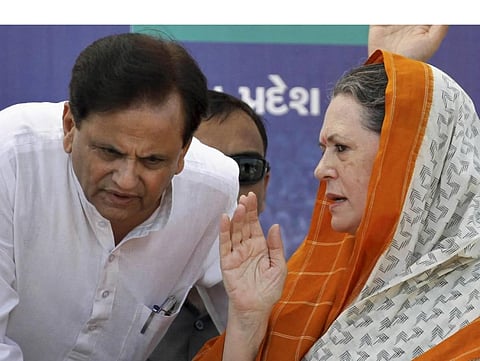

Is it not a quirk of fate, loaded with untold implications, that two Congress leaders who rose from the grassroots in the east and west would die within a day of each other, leaving the old party bereft in so many ways? Tarun Gogoi and Ahmed Patel, strikingly, shared a personal trait: they were both humble in their ways and conduct.
This is a non-trivial fact, for it’s an endangered political quality—the relic of a vanishing way of doing politics, where the challenges of democracy and realpolitik were met with negotiated settlements and smooth resolutions. That this flowed naturally from their dyed-in-the-wool ‘Congressness’, if you will, is equally a marker of that seeming anachronism. It’s a legacy which, with all its flawed baggage, crafted politics around conversations.
In a generation where leaders had to prove their mettle through party work, which included slog hours at AICC, Gogoi and Patel took different routes. Patel rose from the humdrum politics of Bharuch to New Delhi via Ahmedabad—making his mark when the party effected a seemingly impossible turnaround in national politics, playing his role quietly from behind the stage. Gogoi went back from Parliament to become a three-term CM of Assam—a stint that marked, in retrospect, a remarkable time of healing.
Much has been written about Patel, ‘Ahmedbhai’ to all, and his self-effacing backroom skills. Never going after the ostentatious frills of power or ministerial ambitions. Never choosing to move out of that corner bunglow opposite Gyarah Murti—23 Wellingdon Crescent—even when having access to ‘Ahmedbhai’ was a big deal in Lutyens’ Delhi, and the rest of political India.
In fact, he would be upset if he was ever quoted or his mugshot used by the media. If those 10 years of UPA were a fruitful decade, he was the quiet sutradhar, his behind-the-scenes strategies sustaining the Congress, its coalition and the longest serving party president, Sonia Gandhi. Why did Patel choose to be low-key when his rivals within and outside adopted ‘bolte raho’ (keep talking) and ‘chhapte raho’ (get printed/be visible) as mottos to stay relevant? Well, Ahmed Patel did not have to seek relevance. Those who mattered, from Rajiv Gandhi’s time, knew his worth.
But at some level, it also had to do with a deep-seated sadness about the walls he encountered early on in state politics. Once during a conversation, he lamented how the VHP/Modi ethos meant he could simply never aspire to become a mass leader in Gujarat. That deep desire stayed unfulfilled. The last he won a Lok Sabha election was in 1984. Once he lost Bharuch in 1989, in what is still recounted as the first openly “communally charged election”, he shifted base to Rajya Sabha and national politics.
Before that, Patel had lent himself to Rajiv Gandhi’s experimentations — as Gujarat PCC chief as also one of his three parliamentary secreraries. He kept Bharuch in his heart though, returning to it every now and then, even building a swank Congress office with a room for himself around the time the UPA sun set. Patel peaked in Delhi’s power politics as Sonia’s rather astute political secretary, with friends across the board, from politicians of all hues to corporates, NGOs and media.
If Sonia stitched up the UPA alliance, Ahmedbhai sustained it through his backchannel manoeuvres. His personal ideology sat better with Left politics, but he could swing a reluctant heartland Lohiaite like Mulayam to cement the UPA’s survival. Patel’s phonecalls were famously awaited. For the media, he was a coveted line of access. Not only because he was part of the power centre, but also because he would never mislead or misinform. If he said “no decision yet”, it meant exactly that.
The power he thus wielded would often give rise to folklore and not-so-savoury tattle. But any day, post-UPA too, when the baton shifted to Rahul, a crowd would always form around Ahmedbhai in the Central Hall of Parliament, with both political opponents and journalists making a beeline. Even before he was resurrected as AICC treasurer after a brief lull, when he would often talk of retirement.
On his last journey, he’s returning to his roots, in Bharuch’s village Piraman, to be laid to rest next to his parents. He leaves a Congress staring at a hole in the wall, and son Faisal, daughter Mumtaz and wife in deep grief. Patel was a devout Muslim, and deeply secular, and there was no contradiction in the two. That’s what’s gone.